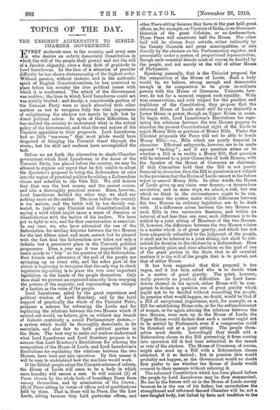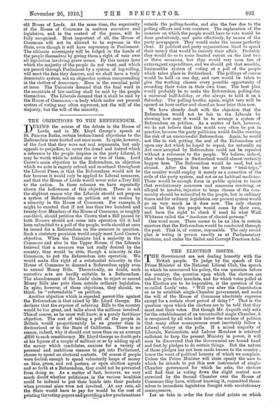TOPICS OF THE DAY.
THE UNIONIST ALTERNATIVE TO SINGLE- CHAMBER GOVERNMENT.
-LIVERY moderate man in the country, and every man 11 who desires an orderly democratic Constitution in which the will of the people shall prevail and not the will of a Jacobin oligarchy, owes a deep debt of gratitude to Lord Lansdowne. In the face of a situation of peculiar difficulty he has shown statesmanship of the highest order. Without passion, without rhetoric, and in the authentic spirit of English Constitutionalism, he has contrived to place before the country the true political issues with which it is confronted. The attack of the Government was sudden; the time in which Lord Lansdowne could act was strictly limited ; and finally, a considerable portion of the Unionist Party were so much absorbed with other matters as not to recognise fully the vital importance of enlightening the electors not merely by talk but by direct political action. In spite of these difficulties, he has enabled the country to understand what is the actual policy of the Government, and what the real nature of the Unionist opposition to their proposals. Lord Lansdowne had so little " sea-room " that most pilots would have despaired of bringing the Unionist vessel through the storm; but his skill and coolness have accomplished the task.
Before we set forth the alternative to single-Chamber government which Lord Lansdowne, in the name of the Unionist Party, has placed before the country, we may be allowed to express our regret that he felt unable to adopt the Spectator's proposal to bring the Referendum at once into the region of practical politics by adding a Referendum clause and schedule to the Veto Bill. We still believe that that was the best course, and the easiest course, and also a thoroughly practical course. Since, however, Lord Lansdowne decided the other way, we shall say nothing more on the matter. The issue before the country is too serious, and the battle will be too fiercely con- tested, to justify any Unionist and Constitutionalist in saying a word which might cause a sense of disunion or dissatisfaction with the tactics of his leaders. We have got to fight to win, and for that concentration is essential. In any case, we, who have advocated the use of the Referendum for settling disputes between the two Houses for the last fifteen years and more, cannot but be pleased with the fact that the Referendum now takes not only a definite but a prominent place in the Unionist political programme. Even a year ago it was impossible to get men's minds to " bite " on the question of the Referendum. Now friends and advocates of the poll of the people are springing up on every side, and the sober part of the nation is beginning to recognise that the only way to check legislative log-rolling is to place the veto over important legislation in the hands of the people themselves. Only thus shall we prevent an organised minority from usurping the powers of the majority, and representing the whisper of a faction as the voice of the people.
Lord Lansdowne, aided by the great experience and political wisdom of Lord Rosebery, and by the loyal support of practically the whole of the Unionist Peers, proposes a scheme for reforming the Lords and for regulating the relations between the two Houses which if carried out would, we believe, give us without any breach of historic continuity a sound Parliamentary system,— a, system which would be thoroughly democratic in its essentials, and also fair to both political parties in the State. The best way to make our readers understand what Lord Lansdowne and Lord Rosebery propose is to assume that Lord Rosebery's Resolutions for altering the composition of the House of Lords, and Lord Lansdowne's Resolutions for regulating the relations between the two Houses, have been put into operation. By this means it will be easy to understand how the machine would work.
If the British people adopt the Unionist scheme of reform, the House of Lords will cease to be a body in which mere heredity will secure a seat. It will consist (1) of Peers chosen by the whole body of hereditary Peers from among themselves, and by nomination of the Crown ; (2) of Peers sitting by virtue of offices and of qualifications held by them. That is, there will be Peers, hke the Law Lords, sitting because they hold particular offices,- and other Peers sitting because they have in the past held great offices, as, for example, ex-Viceroys of India, or ex-Governor- Generals of the great Colonies, or ex-Ambassadors. These Peers will constitute half the House. The other half will be chosen from outside, either indirectly by the County Councils and great municipalities, or else directly by the electors on the Parliamentary register, and presumably under a system of proportional representation, though such essential details must of course be decided by the people, and not merely at the will of either House of Parliament.
Speaking generally, that is the Unionist proposal for the composition of the House of Lords. Such a body would be, we believe, strong enough and democratic enough in its composition to be given co-ordinate powers with the House of Commons. Unionists, how- ever, do not for a moment suggest such equality. With wise conservatism, and. with respect for the practice and traditions of the Constitution, they propose that the reformed House of Lords shall still be very distinctly a Lower House in power, though an Upper House in name. To begin with, Lord Lansdowne's Resolutions for regu- lating the relations between the two Houses propose to abandon the present Constitutional right of the Lords to reject Money Bills Or portions of Money Bills. Under the Unionist proposals the Peers will not be able to 'touch Money Bills which are purely financial in character. Effectual safeguards, however, are to be made against " tacking " ; and if any question arises as to whether a Bill is in reality a Money Bill, that question will be referred to a. joint Committee of both Houses, with the Speaker of the House of Commons as chairman. If that Committee hold that the Bill is not purely financial in character, then the Bill in question is not subject to the provision that the House of Lords cannot in the future reject or amend Money Bills. In other words, the House of Lords gives up any claim over finance,—a tremendous revolution, and in some ways, we admit, a risk, but one which we think in the circumstances ought to be run. Next comes the system under which differences between the two Houses on ordinary legislation are to be dealt with. If a difference arises between the two Houses on such Bills in two successive Sessions, and within an interval of not less than one year, such difference is to be settled by a joint sitting of Members of the two Houses. If, however, the difference between the two Houses relates to a matter which is of great gravity, and which has not been adequately submitted to the judgment of the people, it shall not be referred to a. joint sitting, but shall be sub- mitted for decision to the electors by a Referendum. Here is a perfectly plain and clear admission on the part of one of the great parties in the State that in all essential matters it is the will of the people that is to prevail, not that of either House.
It has been suggested that this proposal is too vague, and it has been asked who is to decide what is a matter of great gravity. The point, however, really presents no practical difficulties. As Lord Lans- downe showed in his speech, either House will be com- petent to declare a question one of great gravity which ought not to be decided without consulting the people. In practice what would happen, no doubt, would be that if a Bill of exceptional importance, such, for example, as a Bill for establishing Home-rule, or for the enfranchisement of women, or for again altering the relations between, the two Houses, were sent up to the House of Lords, the Upper House would declare that such a matter ought not to be settled by Parliament, even if a compromise could be thrashed out at a joint sitting. The people them- selves must decide. Accordingly they would add a Referendum clause to the Bill preventing it from coming into operation till it had been submitted to the assent or veto of the electors. The House of Commons, of course, might also send up a Bill with a Referendum clause attached, if it so desired ; but in practice this would probably not happen, as the Government would no doubt first prefer to see whether the House of Lords would consent to their measure without referring it.
The reformed Constitution which has been placed before the people by Lord Lansdowne may be thus summarised. No one in the future will sit in the House of Lords merely because he is the son of his father, but nevertheless the strengthened and reformed Second Chamber will be, not a new-fangled body, but linked by form and tradition to the old. House of Lords. At the same time, the superiority of the House of Commons in matters executive and legislative, and in the control of the purse, will be fully recognised. Most important of all, the House of Commons will not be allowed to be supreme in the State, even though it will have supremacy in Parliament. The ultimate sovereignty will be lodged in the hands of the people themselves by giving them a right of veto over all legislation involving grave issues. By this means laws which the majority of the people do not want, and which are passed through Parliament by a system of log-rolling, will meet the fate they deserve, and we shall have a truly democratic system, not an oligarchic system masquerading in the clothes of democracy. Here is the essential point at issue. The Unionists demand that the final word in the essentials of law-making shall be said by the people themselves. The Liberals demand that it shall be said by the House of Commons,—a body which under our present system of voting may often represent, not the will of the majority, but the will of the minority.



















































 Previous page
Previous page